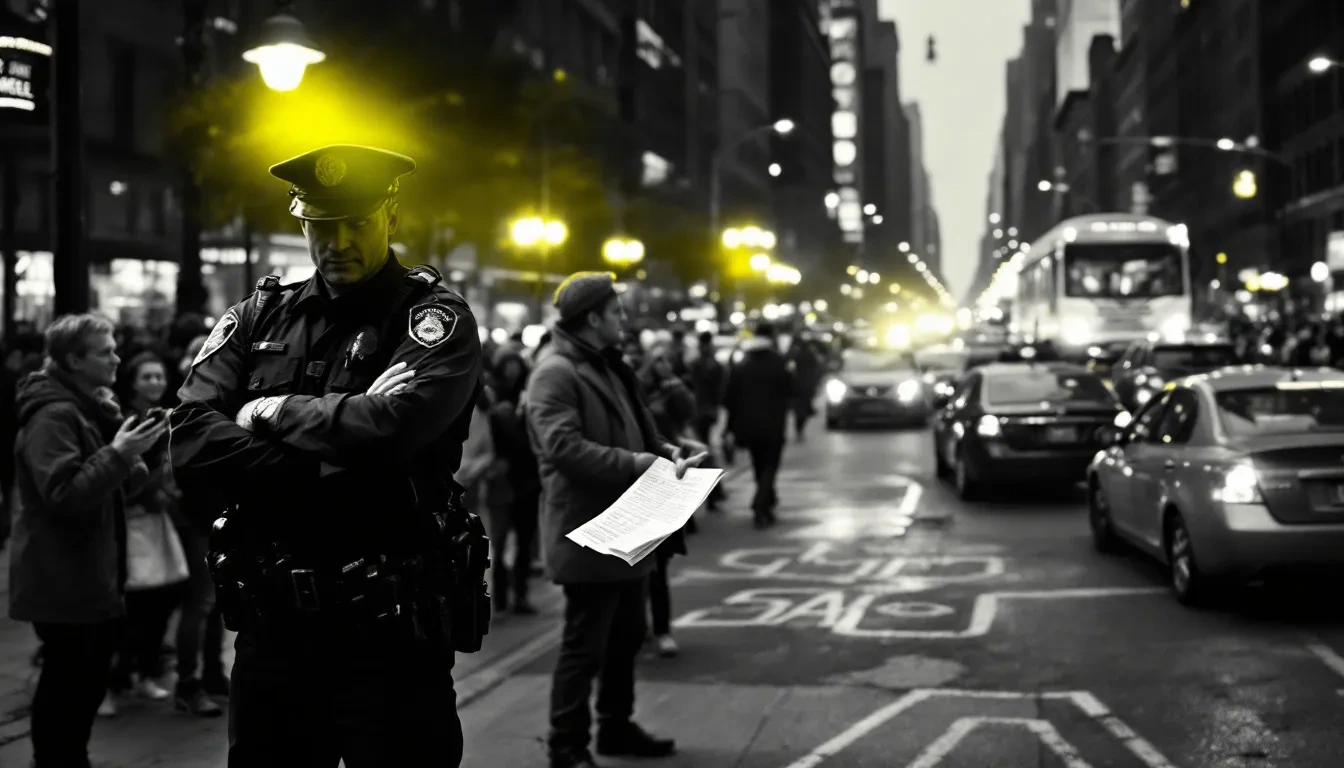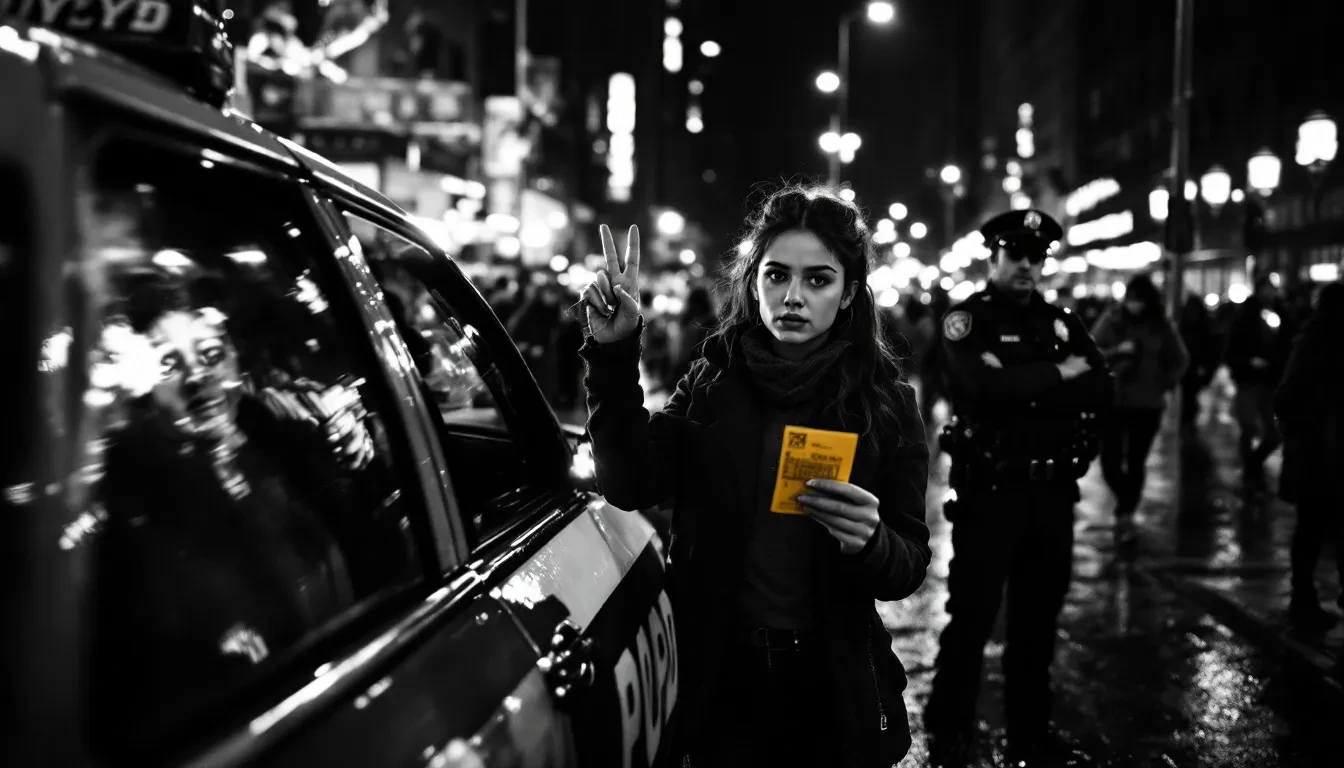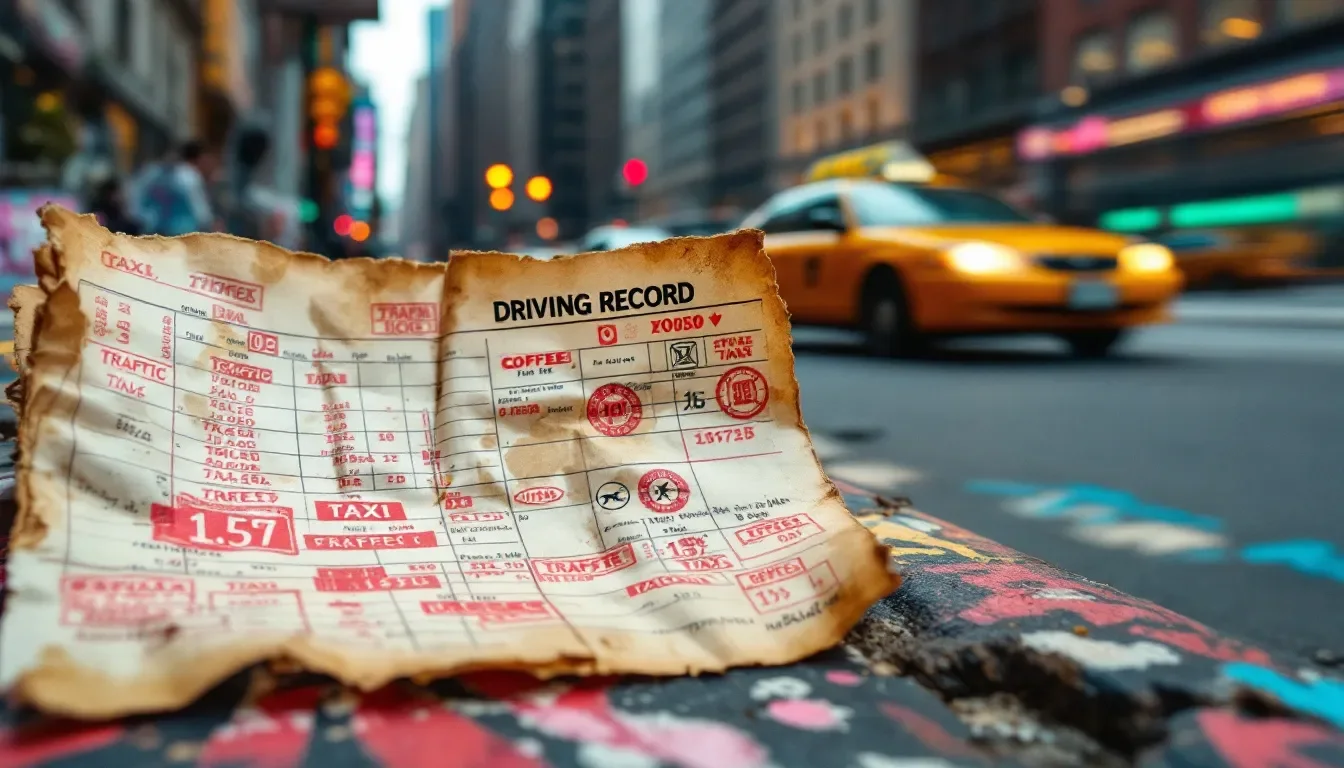Receiving a traffic ticket in New York can be stressful, especially when it comes to dealing with New York traffic tickets. This guide explains what steps to take next. Whether you need to plead guilty, contest the ticket, or manage your driving record, we’ve got practical advice for you.
Key Takeaways
- Traffic tickets in New York are categorized into moving and non-moving violations, each with specific penalties and impacts on driving records.
- After receiving a traffic ticket, it is essential to act quickly by checking ticket details, updating personal information, and deciding to plead guilty or not guilty.
- Completing a defensive driving course can reduce points on your driving record, help avoid license suspension, and lower insurance premiums.
Understanding New York Traffic Tickets

Traffic tickets in New York are classified into two main categories: moving violations and non-moving violations. Moving violations occur when a vehicle is in motion, including traffic offenses such as speeding, running red lights, and reckless driving. These violations not only endanger public safety but also carry significant penalties.
On the other hand, non-moving violations are typically related to documentation issues or vehicle conditions. Examples include driving with an expired registration, parking infractions, and other paperwork-related offenses. While these may seem minor, they can still result in fines and negatively impact your driving record if not addressed promptly.
In New York City, the Traffic Violations Bureau (TVB) handles all tickets and tvb ticket issued within the five boroughs. Operating under the New York Department of Motor Vehicles (DMV), the TVB processes and adjudicates traffic violations. Knowing the role of the TVB helps in understanding how traffic tickets are managed and resolved in the city.
Steps to Take After Receiving a Traffic Ticket in New York
After receiving a traffic ticket, prompt action is necessary. Visit the New York DMV website to check your ticket details by entering your NYS ID Number and traffic ticket number. This ensures you have all the information needed to proceed with your case.
If your address differs from the one listed on the ticket, update it to avoid delays in receiving important communications. This is especially important if you plan to contest the ticket or are awaiting a hearing date.
To reschedule a traffic ticket hearing, contact the Traffic Violations Bureau (TVB) for NYC-issued tickets or the Traffic Court listed on the ticket for other locations. Responding in a timely manner helps avoid additional penalties or complications.
How to Plead Guilty or Not Guilty to a Traffic Ticket
After receiving a traffic ticket, you have two choices: plead guilty or not guilty. If you plead guilty, you must pay a fine, and the conviction will be added to your driving record. This can lead to higher insurance premiums and potential points on your record.
To plead not guilty, submit your plea online or by mail without needing to appear in person. After submission, your case and driving history will be reviewed, and you might receive a reduced plea offer. If you decline the offer or none is provided, a trial will be scheduled before a Judicial Hearing Officer.
If the judge finds you not guilty, no penalties will be imposed. If found guilty, you can still file an appeal if unsatisfied with the judge’s decision. Knowing these options and potential outcomes helps in making an informed decision.
Paying Your Traffic Ticket

In New York, tickets can be paid through various methods. Online payments can be made using credit cards, debit cards, electronic checks, PayPal, or Venmo, though a 2% service charge may apply for credit or debit cards. This method offers convenience and quick processing for a traffic ticket online.
Alternatively, payments can be made by mail using a check or money order without additional fees. Ensure your payment is mailed early enough to reach the Department of Finance within 30 days. This method is cost-effective but requires careful timing to avoid delays.
For in-person transactions, the Department of Finance centers accept cash, checks, or credit cards. Payment plans are available for those unable to pay fines in full. Timely payment is crucial to avoid additional fines and potential license suspension, regardless of the method chosen.
Contesting a Traffic Ticket in New York

Contesting a traffic ticket involves pleading not guilty and preparing a strong defense. Start by gathering supporting evidence, such as witness statements and visual evidence like photos or videos from the incident. This evidence can significantly strengthen your case.
After pleading not guilty, the DMV TVB office or Traffic Court will set a trial date and time. Organize your evidence and practice your testimony to present a compelling argument. Demonstrating a justifiable reason for the traffic violation can potentially lead to a reduction or dismissal of the ticket. The traffic violations plea unit can assist in navigating the complexities of your case.
Hiring an attorney is not mandatory but can be beneficial in navigating the legal process and increasing your chances of a favorable outcome. Attorneys provide valuable insights and effective court representation.
Impact of Traffic Tickets on Your Driving Record

A ticket can have lasting consequences on your driving record. Accumulating 11 points within 18 months can lead to a suspension of your driver’s license. Points from traffic violations remain on your record for as long as the conviction is active, affecting your insurance premiums.
Points are assigned based on the date of the traffic violation, not the conviction date. Once 18 months pass from a violation date, the points for that violation no longer count towards your total. However, accumulating six or more points in 18 months requires you to pay a Driver Responsibility Assessment fee.
To manage points and prevent license suspension, consider completing a Point and Insurance Reduction Program (PIRP) course. This course can reduce the total points used for calculating potential suspensions by 4 points. Regularly checking your driving record helps ensure accuracy and track your points.
License Suspension and Revocation
Too many points on your driving record can lead to license suspension or revocation. In New York, accumulating 11 points within an 18-month period can result in a suspended license. Additionally, earning six or more points in 18 months requires paying a Driver Responsibility Assessment fee.
It’s crucial to respond to your ticket promptly to avoid license suspension. Ignoring a ticket can lead to additional fines and a default conviction. If you fail to pay the fine, your license may be suspended, and a judgment entered against you.
While a defensive driving course does not remove past violations or points from your record, it can prevent future license suspension by reducing the total points. Staying proactive and informed about your driving record is crucial for maintaining driving privileges.
Defensive Driving Courses and Their Benefits
Defensive driving courses offer numerous benefits for drivers in New York. Completing the New York Defensive Driving Course can reduce up to 4 points on your driving record. This reduction can help prevent license suspension and lower insurance premiums.
Completing a Point and Insurance Reduction Program (PIRP) course can also earn participants a 10% discount on auto insurance premiums for up to three years. The New York Defensive Driving Course is approved by the NY Department of Motor Vehicles and widely accepted by insurance carriers in NY and NJ.
How to Check Your Traffic Ticket Status Online
Check your traffic ticket status online using the DMV’s ‘Traffic Ticket Pleas, Hearings and Payments’ service. Provide your NYS ID Number, traffic ticket number, or the last four digits of your social security number. This service allows you to access ticket details and manage your case conveniently.
For areas outside of New York City, different methods for accessing ticket information may be available, including local online resources. Regularly checking your ticket status ensures you stay informed about your case and any upcoming deadlines.
What to Do If You Lose Your Traffic Ticket
If you lose your traffic ticket, print a substitute ticket online by visiting the Substitute Traffic Ticket page on the NYS DMV website. Only open tickets can be printed as substitutes.
Substitute tickets contain the same information as the original and are valid for all legal purposes. This ensures you can manage your traffic ticket even if the original is misplaced.
Tips for Avoiding Future Traffic Tickets

Avoiding future tickets requires diligence and adherence to traffic laws. Strictly follow speed limits and avoid aggressive driving behaviors. This not only prevents violations but also ensures road safety.
Avoid distractions while driving, such as using mobile devices, to keep your attention on road conditions. Wearing seatbelts at all times and ensuring all passengers do the same enhances safety and reduces the chance of citations.
Staying updated on local traffic law and regulations is crucial to prevent unintentional violations. Regularly reviewing the rules of the road helps you remain compliant and avoid future tickets.
Summary
In conclusion, handling traffic tickets in New York requires prompt action, understanding the legal process, and staying informed about your driving record. From pleading your case to paying fines and contesting tickets, each step is crucial for maintaining your driving privileges.
Taking defensive driving courses can offer significant benefits, including reducing points on your driving record and lowering insurance premiums. Staying proactive and informed will help you navigate the complexities of New York traffic laws and keep your driving record clean.
Frequently Asked Questions
What are the two choices for pleading after receiving a traffic ticket in New York?
In New York, after receiving a traffic ticket, you can plead either guilty or not guilty. This decision will determine your next steps in handling the ticket.
What happens if you plead guilty to a speeding ticket in New York?
Pleading guilty to a speeding ticket in New York results in a fine and the conviction being recorded on your driver record. This can lead to increased insurance rates and potential points on your license.
How are speeding tickets classified in New York?
Speeding tickets in New York are classified as non-criminal violations, and they are addressed by local city courts or the Department of Motor Vehicles’ Traffic Violations Bureau.
What can you do if you plan to fight a traffic ticket in New York?
If you plan to fight a traffic ticket in New York, you should submit a not guilty plea and consider hiring an attorney to present your case effectively in court. This approach increases your chances of a favorable outcome.
What happens if your New York point total reaches 11 within an 18-month period?
If your New York point total reaches 11 within an 18-month period, your license will be suspended.
tags: traffic violations, traffic violation, traffic violations plea unit, traffic violations bureau, traffic court, traffic court judge, parking tickets, suspended license, plead guilty online, tvb ticket, driver’s license suspension, traffic ticket number, tvb office, parking ticket, New York DMV, pay online, point system, non criminal moving violations

 Live Chat
Live Chat






